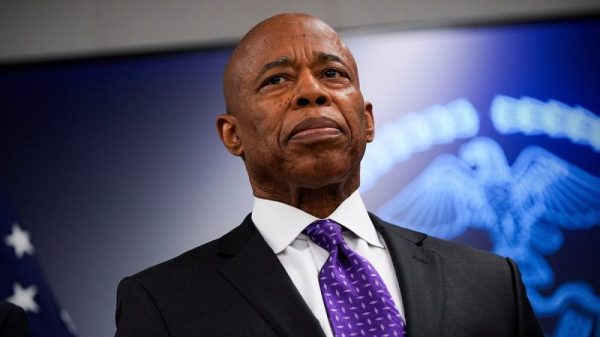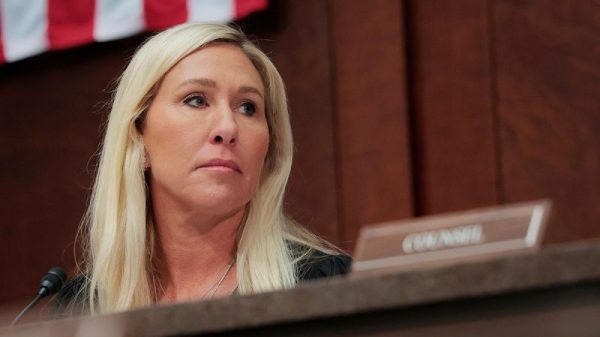House Republicans plan to gather Monday night in a closed-door, phones-off, members-only meeting to discuss where the conference goes next after their speaker, Rep. Kevin McCarthy (R-Calif.), was ousted in a historic vote last Tuesday.
The gathering is the first of several members-only meetings that the conference plans to hold this week as it works to select McCarthy’s successor.
On Tuesday, the conference is scheduled to hold a candidate forum at 5 p.m. Eastern time, and on Wednesday morning it will hold an internal election for speaker. There is still, however, no formal vote for speaker scheduled yet on the House floor — where it will take a majority of the full chamber to elect a leader.
Two leading conservatives, Reps. Jim Jordan (R-Ohio) and Steve Scalise (R-La.), have publicly announced that they are running for the job. Here’s what you need to know about this week’s procedures:
The historic nature of the House Republican procedures this week cannot be overstated.
McCarthy — who was elected speaker after a lengthy and chaotic fight in January — last week became the first speaker ever to be ousted from the role in a House vote after he failed to withstand a rebellion among far-right members.
After his removal, McCarthy announced he would not seek the speakership again — setting up an intraparty battle for the position second in line to the presidency.
During Monday night’s meeting, it is widely expected that members will hash out their differences, raise concerns, voice complaints and debate what comes next for their conference after the events of last week.
“We’ve had hot discussions before in terms of the temperature, and this will be one of those,” said one House Republican, speaking on the condition of anonymity to comment candidly on the conference’s plans.
After this gathering, House Republicans plan to hold a members-only candidate forum on Tuesday night, in which Jordan and Scalise — and any other member interested in becoming the next speaker — will be given the opportunity to pitch themselves to a room of lawmakers mostly unhappy with how things have developed. Only eight House Republicans — led by Rep. Matt Gaetz (Fla.) — voted with all Democrats to oust McCarthy.
“Some of the members feel significant buyer’s remorse and want to revisit bringing [McCarthy] back, but I think [he’s] ultimately made his decision,” said a House Republican, also speaking on the condition of anonymity to comment on the situation.
Republican leaders hope that the conference will be able to rally the 217 votes needed to make sure that the conference’s chosen candidate will be swiftly elected in a full House vote. They are seeking to avoid the chaotic, 15-round vote that led to McCarthy’s speakership in January. But in a sign that these negotiations may take some time, that formal House speaker vote has not yet been put on the calendar.
Rep. Patrick T. McHenry (R-N.C.), who is currently serving as speaker pro tempore, will be the one to oversee and set the date for the floor election.
At that point, it is widely expected that Democrats will nominate and vote for Minority Leader Hakeem Jeffries (D-N.Y.) as speaker. But because Democrats are in the minority, it is highly unlikely Jeffries would prevail.
On Sunday, Jeffries told CNN’s “State of the Union” that he hopes his Republican colleagues “get their act together [and] can settle on a speaker who can receive 217 votes [so] that we can move forward to get the business of the American people done.”
The internal GOP process to select the candidate who will be ultimately brought to the floor for a full vote is run by the office of Rep. Elise Stefanik (R-N.Y.), the No. 3 House Republican and chairwoman of the House Republican Conference.
“I have been in touch with a wide array of my colleagues in the conference, as well as all the candidates for speaker, regarding how the candidate forum is going to function, and my goal is to make sure that we can unify as Republicans and elect a strong speaker on the floor and get back to work on our agenda,” Stefanik told The Washington Post on Sunday.
House Republicans have voiced hope that they will be able to have a new speaker by the end of the week — but there’s no guarantee. On Sunday, some noted that without a speaker, for instance, the House cannot take action following the unprecedented attack this weekend against Israel.
House Foreign Affairs Committee Chairman Michael T. McCaul (R-Tex.) told CNN’s “State of the Union” on Sunday that Republicans “cannot paralyze democracy, especially when we have these hot spots all over the world.”
“It wasn’t my idea to oust the speaker. I thought it was dangerous,” McCaul said. “I look at the world and all the threats that are out there, and what kind of message are we sending to our adversaries when we can’t govern, when we’re dysfunctional, when we don’t even have a speaker of the House? … I think it sends a terrible message.”
Stefanik said it is imperative that the House get back to order so it can secure funding to aid Israel.
On Tuesday, after being named acting speaker, McHenry ordered the House into a recess while the Republican conference privately debated who should next fill the chamber’s top role.
On Sunday, Gaetz — the Republican who introduced the motion that resulted in McCarthy’s ouster — argued in an interview with NBC’s “Meet the Press” that GOP leadership did not move quickly enough to replace McCarthy.
But other members of the GOP conference said they’re glad that McHenry and Stefanik gave the group time to reflect on McCarthy’s ouster, what led to it and how House Republicans can come back together.
“After the chair was vacated last week, members began to meet in their various conferences, caucuses that they belong to. … I think that was constructive,” Rep. French Hill (R-Ark.) said. “I think it was an excellent way to spend time in a post-mortem of how we got in the situation.”
Only two Republicans, Jordan and Scalise, have publicly announced bids.
Scalise is the House majority leader, the No. 2 Republican in the chamber. Jordan chairs the powerful House Judiciary Committee and helped found the conservative House Freedom Caucus.
Republicans backing Scalise include House Majority Whip Tom Emmer (Minn.) and Rep. Mike D. Rogers (Ala.), chairman of the Armed Services Committee and a member of the conservative Republican Study Committee, which Scalise once chaired.
Scalise was first sworn in to Congress in 2008 after campaigning as a voice of the South and red-state Republicans more broadly.
Scalise, however, might, struggle to gain the support of the hard-right House Freedom Caucus. While Scalise is more conservative than McCarthy, the group still sees him as part of the “establishment” and entrenched in GOP leadership.
Jordan, meanwhile, is liked by hard-right Republicans, who nominated him for the speakership in January when McCarthy ultimately prevailed.
Jordan’s backers include Gaetz and Rep. Nancy Mace (R-S.C.) — both of whom voted to oust McCarthy — and former president Donald Trump, who endorsed Jordan last week.
Rep. Virginia Foxx (R-N.C.), who is backing Jordan, told The Post on Sunday that while she is aware that Jordan had a reputation of being “a bit of a rabble rouser” during his early years in Congress — he first came to the House in 2006 — she believes he is the type of legislator that Republicans need.
“I’ve seen him mature, in my opinion, mature into somebody who is focused primarily on legislation,” she said. “And I think that’s important.”
Others, however, are not yet sold on a candidate.
Marisa Iati, Amy B Wang and Marianna Sotomayor contributed to this report.
House Republicans plan to gather Monday night in a closed-door, phones-off, members-only meeting to discuss where the conference goes next after their speaker, Rep. Kevin McCarthy (R-Calif.), was ousted in a historic vote last Tuesday.
The gathering is the first of several members-only meetings that the conference plans to hold this week as it works to select McCarthy’s successor.
On Tuesday, the conference is scheduled to hold a candidate forum at 5 p.m. Eastern time, and on Wednesday morning it will hold an internal election for speaker. There is still, however, no formal vote for speaker scheduled yet on the House floor — where it will take a majority of the full chamber to elect a leader.
Two leading conservatives, Reps. Jim Jordan (R-Ohio) and Steve Scalise (R-La.), have publicly announced that they are running for the job. Here’s what you need to know about this week’s procedures:
The historic nature of the House Republican procedures this week cannot be overstated.
McCarthy — who was elected speaker after a lengthy and chaotic fight in January — last week became the first speaker ever to be ousted from the role in a House vote after he failed to withstand a rebellion among far-right members.
After his removal, McCarthy announced he would not seek the speakership again — setting up an intraparty battle for the position second in line to the presidency.
During Monday night’s meeting, it is widely expected that members will hash out their differences, raise concerns, voice complaints and debate what comes next for their conference after the events of last week.
“We’ve had hot discussions before in terms of the temperature, and this will be one of those,” said one House Republican, speaking on the condition of anonymity to comment candidly on the conference’s plans.
After this gathering, House Republicans plan to hold a members-only candidate forum on Tuesday night, in which Jordan and Scalise — and any other member interested in becoming the next speaker — will be given the opportunity to pitch themselves to a room of lawmakers mostly unhappy with how things have developed. Only eight House Republicans — led by Rep. Matt Gaetz (Fla.) — voted with all Democrats to oust McCarthy.
“Some of the members feel significant buyer’s remorse and want to revisit bringing [McCarthy] back, but I think [he’s] ultimately made his decision,” said a House Republican, also speaking on the condition of anonymity to comment on the situation.
Republican leaders hope that the conference will be able to rally the 217 votes needed to make sure that the conference’s chosen candidate will be swiftly elected in a full House vote. They are seeking to avoid the chaotic, 15-round vote that led to McCarthy’s speakership in January. But in a sign that these negotiations may take some time, that formal House speaker vote has not yet been put on the calendar.
Rep. Patrick T. McHenry (R-N.C.), who is currently serving as speaker pro tempore, will be the one to oversee and set the date for the floor election.
At that point, it is widely expected that Democrats will nominate and vote for Minority Leader Hakeem Jeffries (D-N.Y.) as speaker. But because Democrats are in the minority, it is highly unlikely Jeffries would prevail.
On Sunday, Jeffries told CNN’s “State of the Union” that he hopes his Republican colleagues “get their act together [and] can settle on a speaker who can receive 217 votes [so] that we can move forward to get the business of the American people done.”
The internal GOP process to select the candidate who will be ultimately brought to the floor for a full vote is run by the office of Rep. Elise Stefanik (R-N.Y.), the No. 3 House Republican and chairwoman of the House Republican Conference.
“I have been in touch with a wide array of my colleagues in the conference, as well as all the candidates for speaker, regarding how the candidate forum is going to function, and my goal is to make sure that we can unify as Republicans and elect a strong speaker on the floor and get back to work on our agenda,” Stefanik told The Washington Post on Sunday.
House Republicans have voiced hope that they will be able to have a new speaker by the end of the week — but there’s no guarantee. On Sunday, some noted that without a speaker, for instance, the House cannot take action following the unprecedented attack this weekend against Israel.
House Foreign Affairs Committee Chairman Michael T. McCaul (R-Tex.) told CNN’s “State of the Union” on Sunday that Republicans “cannot paralyze democracy, especially when we have these hot spots all over the world.”
“It wasn’t my idea to oust the speaker. I thought it was dangerous,” McCaul said. “I look at the world and all the threats that are out there, and what kind of message are we sending to our adversaries when we can’t govern, when we’re dysfunctional, when we don’t even have a speaker of the House? … I think it sends a terrible message.”
Stefanik said it is imperative that the House get back to order so it can secure funding to aid Israel.
On Tuesday, after being named acting speaker, McHenry ordered the House into a recess while the Republican conference privately debated who should next fill the chamber’s top role.
On Sunday, Gaetz — the Republican who introduced the motion that resulted in McCarthy’s ouster — argued in an interview with NBC’s “Meet the Press” that GOP leadership did not move quickly enough to replace McCarthy.
But other members of the GOP conference said they’re glad that McHenry and Stefanik gave the group time to reflect on McCarthy’s ouster, what led to it and how House Republicans can come back together.
“After the chair was vacated last week, members began to meet in their various conferences, caucuses that they belong to. … I think that was constructive,” Rep. French Hill (R-Ark.) said. “I think it was an excellent way to spend time in a post-mortem of how we got in the situation.”
Only two Republicans, Jordan and Scalise, have publicly announced bids.
Scalise is the House majority leader, the No. 2 Republican in the chamber. Jordan chairs the powerful House Judiciary Committee and helped found the conservative House Freedom Caucus.
Republicans backing Scalise include House Majority Whip Tom Emmer (Minn.) and Rep. Mike D. Rogers (Ala.), chairman of the Armed Services Committee and a member of the conservative Republican Study Committee, which Scalise once chaired.
Scalise was first sworn in to Congress in 2008 after campaigning as a voice of the South and red-state Republicans more broadly.
Scalise, however, might, struggle to gain the support of the hard-right House Freedom Caucus. While Scalise is more conservative than McCarthy, the group still sees him as part of the “establishment” and entrenched in GOP leadership.
Jordan, meanwhile, is liked by hard-right Republicans, who nominated him for the speakership in January when McCarthy ultimately prevailed.
Jordan’s backers include Gaetz and Rep. Nancy Mace (R-S.C.) — both of whom voted to oust McCarthy — and former president Donald Trump, who endorsed Jordan last week.
Rep. Virginia Foxx (R-N.C.), who is backing Jordan, told The Post on Sunday that while she is aware that Jordan had a reputation of being “a bit of a rabble rouser” during his early years in Congress — he first came to the House in 2006 — she believes he is the type of legislator that Republicans need.
“I’ve seen him mature, in my opinion, mature into somebody who is focused primarily on legislation,” she said. “And I think that’s important.”
Others, however, are not yet sold on a candidate.
Marisa Iati, Amy B Wang and Marianna Sotomayor contributed to this report.





















